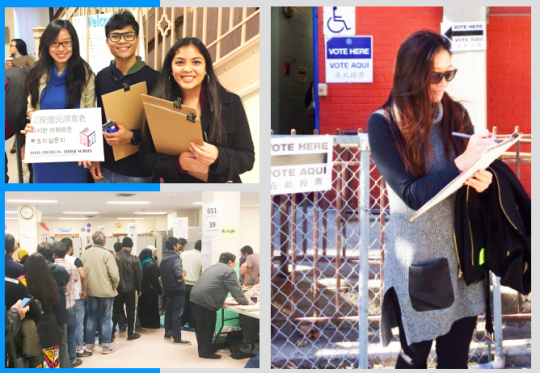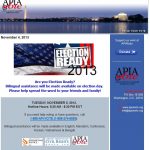March 21, 2013 – 86% of Asian Americans polled in New York voted for President Obama and two-thirds support immigration reform, according to the results of the Asian American Legal Defense and Education Fund (AALDEF) exit poll in New York, released today. AALDEF conducted a nonpartisan multilingual exit poll of 4,089 Asian American voters in New York in the November 2012 elections, the largest survey of its kind.
“Asian Americans are a rapidly growing portion of the electorate in New York,” said AALDEF executive director Margaret Fung. “Elected officials and candidates should understand the policy priorities of Asian American voters, from the economy to immigration reform.”
86% of Asian Americans polled in New York voted for President Obama, compared to 77% of those polled nationally by AALDEF. Among Asian New Yorkers surveyed, 69% were Democrats, 8% were Republicans. and 20% were not enrolled in any party.
The findings also indicate that two out of three Asian Americans (67%) polled in New York supported immigration reform, including a path to citizenship. 70% of those who voted for Obama supported immigration reform, and almost half (49%) of those who voted for Romney supported immigration reform.
“As Senator Charles Schumer and the ‘Gang of Eight’ are poised to propose an immigration overhaul, our exit poll indicates that Asian Americans stand strongly behind comprehensive immigration reform and a path to citizenship,” said Fung.
On Election Day, AALDEF polled Asian American voters in 37 cities across 14 states and documented voting problems. In New York, AALDEF conducted the exit poll in counties with large Asian American populations: New York (Manhattan), Kings (Brooklyn), and Queens Counties. The largest Asian ethnic groups in the New York exit poll were Chinese (43%), Bangladeshi (20%), Korean (11%), Asian Indian (11%), Filipino (4%), and Indo-Caribbean (3%).
Across all ethnic groups, limited English proficiency was high. 45% of Asian Americans in New York spoke English less than “very well” compared to 37% of all Asian Americans nationally. Korean Americans had the highest rate of limited English proficiency at 69%, followed by 51% of Chinese Americans, and 48% of Bangladeshi Americans.
AALDEF Democracy Program Director Glenn Magpantay said: "We must ensure that the New York City Board of Elections meets its obligations under the Voting Rights Act to provide language assistance in Chinese, Korean, and Bengali. With the upcoming 2013 mayoral and citywide elections, it is critical for the Board of Elections to fix the election process so that Asian Americans and all New Yorkers can exercise their right to vote.”
“New York’s voting process and language assistance must accommodate its increasingly diverse electorate,” said Jerry Vattamala, staff attorney with AALDEF. “New York must continue to gather information about various ethnic groups to determine whether or not counties need to provide language assistance in elections, and the Board of Elections must continue to work with voting rights organizations to ensure that it is meeting its federally mandated requirements for interpreters, signs, and bilingual ballots.”
Magpantay presented the exit poll results at the offices of Dickstein Shapiro in New York City. Key findings on “The Asian American Vote in the 2012 Presidential Election” include the following:
Asian Americans are a growing portion of the New York electorate.
· In the 2012 elections, 29% of Asian Americans were first time voters. Of the Asian American voters surveyed, more than 1 out of 3 (34%) in Brooklyn, almost 1 in 3 (30%) in Queens, and 1 out of 5 (20%) in Manhattan were first-time voters.
A majority of Asian Americans favored comprehensive immigration reform.
- 67% of Asian Americans in New York supported immigration reform, including a path to citizenship, with the highest support from 80% of Bangladeshi, 78% of Indo-Caribbean, 76% of Korean, 76% of Filipino, 68% of Asian Indian, and 56% of Chinese American voters.
· 70% of those who voted for Obama supported immigration reform, and almost half (49%) of those who voted for Romney supported immigration reform.
- 70% of those who voted for Senator Kirsten Gillibrand supported immigration reform. In all of the races for House of Representatives, the majority of Asian American voters supported immigration reform.
· 71% of Democrats, 59% of Republicans, and 60% not enrolled in any political party supported immigration reform.
The majority of Asian Americans in New York voted for the Democratic candidate for Congress and President.
· 83% of Asian Americans in New York voted for incumbent Senator Kirsten Gillibrand, compared to 9% for Wendy Long.
· In all of the congressional districts surveyed, at least 75% of Asian Americans voted for the Democratic candidate for House of Representatives.
· In the presidential race, 86% of Asian Americans in New York voted for Barack Obama. The highest support came from South Asian voters: 97% of Bangladeshi and Indo-Caribbean and 89% of Asian Indian Americans.
· Support for President Obama was consistent across all categories, including first-time (90%), foreign-born (87%), native-born (87%), limited English proficient (87%) and English proficient (85%) voters, and voters of all age groups.
· The major factors influencing the Asian American vote in New York were economy/jobs (52%), health care (36%), civil rights/immigrants rights (29%), education (25%), women’s issues (13%), and terrorism/security (11%).
Asian Americans in New York have higher levels of limited English proficiency.
· 45% of Asian Americans in New York spoke English less than “very well” compared to 37% of all Asian Americans nationally. Korean Americans had the highest rate of limited English proficiency at 69%, followed by 51% of Chinese Americans, and 48% of Bangladeshi Americans.
Voting barriers persisted.
Voters were asked if they encountered any voting problems. Below are the numbers of complaints:
· 1120 were required to show identification though 706 of them were not first-time voters and therefore not required to show ID.
· 120 were required to prove their U.S. citizenship.
· 211 indicated that their names were missing or had errors in the voter lists at poll sites.
· 136 had to vote by affidavit ballot.
· 116 voters indicated that poll workers were not informed.
· 97 voters indicated that poll workers were rude or hostile.
· 74 voters indicated that no interpreters or translated materials were available when needed.
· 61 were directed to the wrong polling place or the wrong voting machine or table within a site.
VIEW THE PRESENTATION >
View release online >
Contact:
Ujala Sehgal
212.966.5932 x.217
usehgal@aaldef.org
About the Exit Poll:
AALDEF’s multilingual exit polls reveal vital information about Asian American voting patterns that is often overlooked in mainstream voter surveys. AALDEF has conducted exit polls of Asian American voters in every major election since 1988. In 2012, more than 100 community groups and organizations joined AALDEF to mobilize over 800 attorneys, law students, and volunteers to conduct the exit poll and to safeguard the voting rights of Asian Americans. A list of co-sponsoring organizations and law firms follows below.
About AALDEF:
The Asian American Legal Defense and Education Fund (AALDEF), founded in 1974, is a national organization that protects and promotes the civil rights of Asian Americans. By combining litigation, advocacy, education, and organizing, AALDEF works with Asian American communities across the country to secure human rights for all.

2012 ASIAN AMERICAN EXIT POLL – Co-Sponsoring Organizations and Law Firms
National Co-Sponsors
Alliance of South Asian American Labor
Asian Pacific American Labor Alliance
APIAVote
Common Cause
Lawyers’ Committee for Civil Rights Under Law
National Asian Pacific American Bar Association
National Coalition for Asian Pacific American Community Development
National Korean Amer. Service & Education Consortium
National Queer Asian Pacific Islander Alliance
North American South Asian Bar Association
OCA (formerly Organization of Chinese Americans)
South Asian Americans Leading Together
Local Co-Sponsors
ACCESS – MI
APALA – Nevada
APIA Vote – Michigan
Asian American Society of Central Virginia
Boat People SOS Delaware Valley – PA
CAAAV – NY
Cambodian Association of Greater Philadelphia
Center for Pan Asian Community Services – GA
Chhaya CDC – NY
Chinese-American Planning Council – NY
Chinese Community Federation of Atlanta
Chinese Progressive Association – MA
Coalition of Asian Pacific Americans of Virginia
East Coast Asian American Student Union
Gay Asian and Pacific Islander Men of New York
Hunter College/CUNY, Asian American Studies Program – NY
Korean American Civic Empowerment of NY/NJ
Korean American Resource and Cultural Center – IL
MinKwon Center for Community Action – NY
NAAAP – New York
NAAAP – Philadelphia
NANAY – FL
NAPAWF – DC
NAPAWF – New York City
OCA: Georgia
OCA: Greater Houston
OCA: Greater Philadelphia
OCA: Greater Washington DC
OCA: Northern Virginia
OCA: South Florida
Pace University, ACE House – NY
Pennsylvania Immigration and Citizenship Coalition
Philadelphia Chinatown Development Corporation
Princeton Asian American Students Association – NJ
Q-WAVE – NY
South Asian Lesbian & Gay Association of New York
U. California San Diego, Lambda Phi Epsilon
U. Maryland, College Park, Asian American Studies Prog.
U. Massachusetts Boston, Asian American Studies Prog.
Vietnamese American Young Leaders Association of New Orleans
Legal Co-Sponsors
Asian American Bar Association of Houston
Asian American Bar Association of New York
Asian American Lawyers Assoc. of Massachusetts
Asian American Legal Advocacy Center of Georgia
Asian Bar Association of Las Vegas – NV
Asian Pacific American Bar Assoc. of Wash., DC
Asian Pacific American Bar Assoc. of Pennsylvania
Asian Pacific American Bar Assoc. of South Florida
Asian Pacific American Lawyers Association of NJ
Asian Pacific American Legal Resource Center – DC
Boston University School of Law, APALSA – MA
Brooklyn Law School, APALSA – NY
Columbia Law School, APALSA – NY
Filipino Amer. Legal Defense & Educ. Fund, Inc. – NY
Georgetown Law, APALSA – DC
Georgia Asian Pacific American Bar Association
Greater Boston Legal Services: Asian Outreach Unit
Harvard Law School, APALSA – MA
Korean Amer. Bar Assoc. of the Washington DC Area
Korean American Lawyers Association of Greater NY
Louisiana Asian Pacific American Bar Association
Muslim American Bar Association of New York
New England School of Law, APALSA – MA
Pace Law School, Public Interest Law Center – NY
Rutgers School of Law-Newark, APALSA – NJ
South Asian Bar Association of New York
South Asian Bar Association of Washington, DC
Suffolk U. Law Rappaport Center for Law and Public Service
University of Nevada, Las Vegas, APALSA
U. Penn. Law, Public Interest Office and APALSA
Law Firm Co-Sponsors
Alston & Bird LLP
Ballard Spahr LLP
Crowell & Moring LLP
Debevoise & Plimpton LLP
Duane Morris LLP
Edwards Wildman Palmer LLP
Finnegan, Henderson, Farabow, Garrett & Dunner, LLP
Fowler White Boggs
Fried, Frank, Harris, Shriver & Jacobson LLP
Hogan Lovells
K&L Gates LLP
Kaye Scholer LLP
Kelley Drye & Warren LLP
McCarter & English LLP
Morrison & Foerster LLP
Orrick, Herrington & Sutcliffe LLP
Paul Hastings LLP
Paul, Weiss, Rifkind, Wharton & Garrison LLP
Pepper Hamilton LLP
Proskauer Rose LLP
Ropes & Gray LLP
Shearman & Sterling LLP
Skadden, Arps, Slate, Meagher & Flom LLP
Sutherland Asbill & Brennan LLP
Weil, Gotshal & Manges LLP
White & Case LLP









